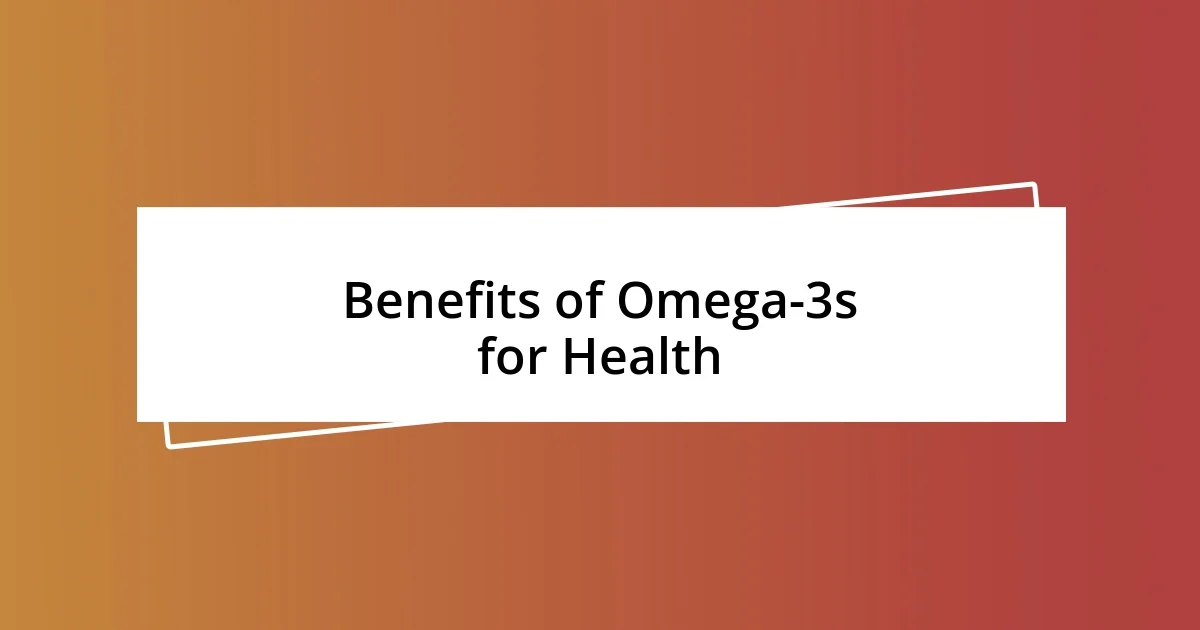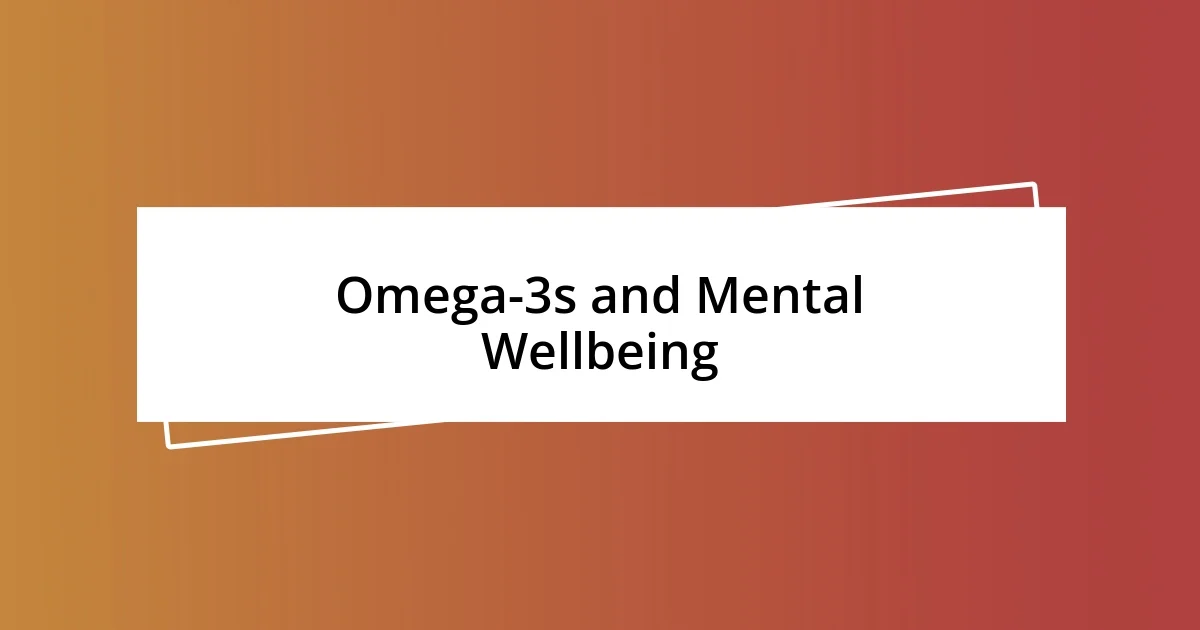Key takeaways:
- Omega-3 fatty acids are essential for health, sourced mainly from fish and plant-based options like flaxseeds and walnuts, playing a critical role in heart, brain, and mental health.
- Research and personal experiences indicate that omega-3s can reduce inflammation, enhance cognitive function, and improve mood and emotional wellbeing.
- Incorporating omega-3s into one’s diet through food or supplements can lead to noticeable improvements in energy levels, mood, and overall health, emphasizing the connection between diet and wellbeing.

Introduction to Omega-3s
Omega-3 fatty acids are essential fats that our bodies need but can’t produce on their own. It’s fascinating how something so vital is often overlooked in our diets, isn’t it? I remember the first time I learned about omega-3s; I was surprised to discover how much they can affect everything from my mood to heart health.
These nutrients come primarily from fish, flaxseeds, and walnuts, and they play a crucial role in brain function and cell structure. I used to think that all fats were bad, but understanding omega-3s has completely changed my perspective. Have you ever felt confused about which foods are healthy fats? It’s a common dilemma, but once I started incorporating omega-3-rich foods into my meals, I noticed a real difference in my energy levels.
Research has shown that omega-3s can reduce inflammation and support heart health, making them a powerhouse nutrient. When I added more omega-3s to my diet, I found my overall well-being improved significantly. Have you ever tried a new diet or supplement that made you feel instantly better? That’s the kind of experience omega-3s have offered me, and it’s worth exploring how they might benefit you too.

Benefits of Omega-3s for Health
In my experience, omega-3 fatty acids have incredible benefits that extend beyond just physical health. I remember a period when I was particularly stressed and overwhelmed; adding omega-3s to my diet helped me regain my mental clarity. I always felt calmer and more focused, which made a world of difference in managing my daily tasks. It’s intriguing to think that something as simple as a fish oil supplement could have such a profound impact on my mood and cognitive function.
The health benefits of omega-3s are well-documented, and they deserve our attention. Here are a few key advantages that I’ve personally experienced and observed:
- Heart Health: Omega-3s can lower triglyceride levels, contributing to a healthier heart.
- Reduced Inflammation: They help combat inflammation, which can lead to a host of chronic diseases.
- Cognitive Function: I’ve noticed enhanced memory and focus, especially during busy workdays.
- Mental Well-Being: Omega-3s have been linked to reduced symptoms of depression and anxiety, which I found helpful during stressful times.
- Eye Health: They support eye health, particularly beneficial for those who spend long hours in front of screens.
Embracing omega-3s has truly been a transformative journey for me, influencing not just my health but my overall outlook on life.

Sources of Omega-3 Fatty Acids
When it comes to sourcing omega-3 fatty acids, I always think of fish as the gold standard. Fatty fish like salmon, mackerel, and sardines are packed with EPA and DHA—two types of omega-3s that have been shown to benefit heart health and brain functioning. I recall enjoying a grilled salmon dinner one night; the taste was delightful, and I felt a surge of energy afterward. Have you ever felt nourished simply by eating something that was not only delicious but also good for your body?
For those who prefer plant-based options, flaxseeds and chia seeds are fantastic choices. Both are rich in ALA, a type of omega-3 that our bodies can convert into EPA and DHA, although not very efficiently. When I sprinkle chia seeds on my morning oatmeal, I appreciate not only the texture but also the nutritional benefits they bring. It’s fascinating how something so small can pack such a healthy punch, isn’t it?
If you find it challenging to incorporate enough omega-3s through diet alone, supplements like fish oil or algal oil can be excellent alternatives. I remember the first time I tried a fish oil supplement; I was pleasantly surprised to find that it didn’t leave a fishy aftertaste, which was a common concern for me. It opened my eyes to how simple it can be to ensure I’m getting these essential fats without having to overhaul my diet completely.
| Source | Type of Omega-3 |
|---|---|
| Fatty Fish (salmon, mackerel, sardines) | EPA and DHA |
| Flaxseeds | ALA |
| Chia Seeds | ALA |
| Walnuts | ALA |
| Algal Oil (supplement) | EPA and DHA |

Recommended Dosages for Omega-3s
The recommended dosage for omega-3 fatty acids can vary based on individual health needs and dietary habits. I often recommend aiming for about 250 to 500 milligrams of combined EPA and DHA daily, especially for those looking to support heart health and cognitive function. This dose has been my sweet spot, feeling just right without overwhelming my system.
When I first dived into omega-3 supplementation, I was curious about the impact of higher dosages. I discovered that for specific concerns, such as high triglyceride levels or inflammatory issues, some might benefit from up to 2,000 to 4,000 milligrams daily. It made me think: how often do we underestimate the power of tailored nutrition? Knowing it can vary depending on personal health goals encourages me to really listen to my body and adapt accordingly.
It’s also crucial to remember that not everyone’s needs are the same. For instance, I’ve spoken with friends who felt great on lower doses, while others swore by larger amounts for managing anxiety or joint pain. Wouldn’t it be interesting to track how different dosages work for varying lifestyles and health conditions? This personal experimentation has become a part of my omega-3 journey, improving my understanding of what feels best for me over time.

Omega-3s and Mental Wellbeing
In my experience, omega-3s have a profound impact on mental wellbeing. I remember a particularly stressful period when I decided to increase my intake of fatty fish. It felt like a weight lifted off my shoulders; not only did my mood improve, but I also noticed I handled stress with much more grace. Have you ever considered how your diet might influence your emotional state?
Research supports the connection between omega-3s and mental health. I often refer to studies showing that individuals with higher levels of EPA and DHA tend to report lower levels of anxiety and depression. It’s fascinating to think that something as simple as adjusting my diet could create a ripple effect on my overall emotional landscape.
Moreover, I find it interesting that the effects of omega-3s go beyond just mood enhancement. I’ve noticed that my concentration improves, especially when I’m working on projects that require deep focus. It’s like giving my brain the fuel it craves. Do you notice changes in your cognitive abilities when you prioritize omega-3s in your diet? For me, every bite of salmon not only tastes great but also feels like I’m investing in my mental clarity.

Incorporating Omega-3s into Diet
Incorporating omega-3s into my diet has been a delightful discovery. I love starting my day with a smoothie that includes chia seeds, which are packed with omega-3s. It’s such a simple and tasty way to kick off my morning, and I feel energized throughout the day. Have you ever tried adding a small ingredient that makes a big difference?
When I realized that not all omega-3 sources have to be fish, I began exploring plant-based options. One of my favorites became flaxseeds; I simply sprinkle them on my oatmeal or salads. The nutty flavor enhances my meals while increasing my omega-3 intake. It’s remarkable how small changes in our meals can contribute to our overall health, don’t you think?
Shopping for quality sources of omega-3s is essential too. I make a point to look for wild-caught salmon or high-quality fish oil supplements. The first time I chose wild-caught over farmed, I noticed a difference in taste and quality. It’s a small investment that pays off in how I feel. Each time I reach for these nutritious options, I remind myself that I deserve the best for my body and mind.

Real-Life Experiences with Omega-3s
Finding real-life experiences with omega-3s has opened my eyes to their impact on everyday life. I recall a summer when I began cooking more with walnuts and hemp seeds, not only for their crunch but also for their omega-3 content. I felt more balanced and calm, and I started to wonder if others in my circle experienced similar shifts when incorporating these nutritional powerhouses.
As I continued to delve into the world of omega-3s, I decided to keep a food journal to track my mood and energy levels. Interestingly, on days when I indulged in dishes featuring omega-3-rich ingredients, I felt a noticeable uplift in my spirits and creativity. Have you ever noticed a direct relationship between what you eat and how you feel? It’s almost as if I could chart my emotional landscape right alongside my meals.
Most surprisingly, I’ve found that even small changes can yield significant results. I remember a particularly focused afternoon during which I snacked on seaweed crisps. My energy did not wane, and my focus was sharper than usual. This experience made me ponder—could the right snacks be the missing piece in my productivity puzzle? Incorporating omega-3s has truly reshaped how I view my health journey, emphasizing the connection between diet and overall well-being.














